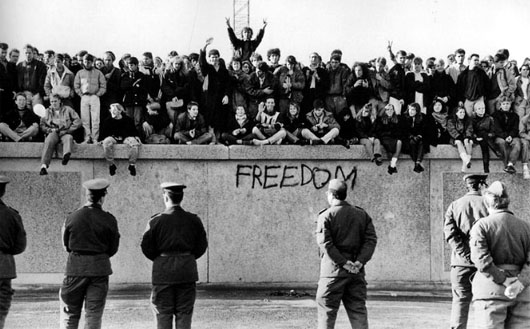Special to WorldTribune.com
UNITED NATIONS — Thirty years ago on Nov. 9 1989, the world suddenly changed. Mass civil and religious demonstrations rocking East German cities created a political tsunami which soon reached Berlin.
Berlin, the divided city and German capital at the epicenter of the Cold War, would see an unexpected performance of Beethoven’s “Ode to Joy” as throngs of East German comrades suddenly rushed towards the Berlin Wall and finally breached the barrier.

Yes on that November night, the Joshua Trumpet sounded, and the Wall came tumbling down. As in a Fairy Tale the Wall had fallen…the evil force was seemingly gone, banished. Germany would become reunited a year later in peace and freedom. Europe would be whole and free.
Yet these extraordinary events just didn’t happen by chance but through a rare combination of spiritual, political and economic factors. The stars had to be aligned just right!
What were called the socialist states, those counties abandoned to Stalin’s charms at Yalta and condemned to a forgotten fate behind what Churchill would call the Iron Curtain, suddenly erupted in a frenzy of freedom to break away from Moscow’s icy grip.
The election of Pope John Paul II, a Polish pontiff was the first step. This was a decade earlier in 1978 when he became the first non-Italian Pontiff in 400 years and energized a religious reawakening in Poland where the People’s Republic could never totally subdue the Catholic Church. Besides a Polish Pope, Central Europe’s largest nation also saw a free trade union movement Solidarity emboldened.
But Poland alone was not strong enough to change Europe’s post WWII geopolitical game board. Hungary too saw the local communists waver; months before the epic events in Berlin, thousands of East Germans were allowed to transit through Hungary to the West.
Ronald Reagan, elected president of the USA in 1980, formed the second building block.
The Reagan Administration unapologetically confronted Soviet communism and didn’t flinch in supporting NATO. Standing before the Berlin Wall in June 1987, President Reagan challenged the new Soviet leader, “Mr. Gorbachev, Tear down this Wall.” At the time the speech was largely met with smirking contempt on both sides of the Atlantic.
Indeed Mikhail Gorbachev, the reformist Soviet leader wavered and then blinked at the critical moment. And West Germany’s Chancellor Helmut Kohl focused his vision on reunification, again at the crucial moment. Freedom would soon prevail from Poland, to Hungary, Czechoslovakia and East Germany.
German President Frank-Walter Steinmeier paid particular tribute to Germany’s neighbors; “Without the courage of the will to freedom of the Poles and Hungarians, the Czechs and Slovaks, the peaceful revolutions in Eastern Europe and Germany’s reunification would not have been possible.”
Having seen the Berlin Wall a decade before these momentous events it would be nearly inconceivable that this austere and brutal cold concrete barrier which ripped through the heart of one of Europe’s great cities would ever fall, short of a major conflict. The Wall and the entire formidable inter-German barrier dividing the country for that matter, solidified systems and ossified ideologies. It stood as a silent testament to terror for a quarter century.
Behind the Wall stood the German Democratic Republic, the dour socialist satrap which needed a barrier to keep its comrades in.
U.S. Secretary of State Mike Pompeo in a momentous and memorable address in Berlin stated, “East Germans knew they weren’t alone. They knew they had a partner. And they took heart from the soaring words of leaders and deeds of Presidents Truman and Kennedy and Reagan.”
“They saw kindred spirits all across the world. They saw them in Poland, the march for Solidarity. They felt the prayers of Pope John Paul II,” he added.
Yet German Chancellor Angela Merkel warned, “the values on which Europe is founded, freedom, democracy, equality, rule of law, human rights, they are anything but self-evident and they have to be revitalized and defended time and time again.”
Secretary Pompeo added, “let us also not take lightly the threats to our freedoms, the challenges that we all face from regimes, regimes that rule instead of govern, regimes that crush rights instead of protect them, regimes for which this anniversary is a fearful warning, not a cause for celebration.”
Transatlantic solidarity and values bound the U.S. and Europe together during the Cold War. Sadly, over the past twenty years the focus of shared security and political interests has blurred.
Clearly, the USA working in multilateral tandem with our NATO partners still offers the best defense for America’s own security.
John J. Metzler is a United Nations correspondent covering diplomatic and defense issues. He is the author of Divided Dynamism the Diplomacy of Separated Nations: Germany, Korea, China (2014). [See pre-2011 Archives]

 By
By